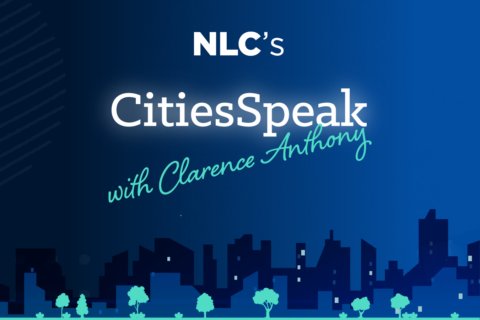Local governments are notoriously under-resourced and overstretched. During the first two years of the pandemic, employment in municipal government declined at a higher rate than other sectors. The urgent tasks required to meet the basic needs of residents – for example, making sure trash gets picked up on time – can often put much-needed initiatives on the back burner. Partnerships with the private and non-profit sectors allow cities to innovate, modernize, and deliver solutions for their residents in ways that would be impossible alone.
Through the Capstone Challenge program, NLC facilitates short-term, pro-bono partnerships between member cities and NLC’s trusted Capstone and Enterprise partners. This gives cities the opportunity to complete a critical project that requires additional capacity. For example, Huntington, WV, and Northglenn, CO, partnered with Pallet Shelter to create city-specific action plans to combat unsheltered homelessness. Jamestown, NY, worked with Esri to survey and understand the issue of blight in their city, so they can craft policies and employ city resources to alleviate it.
Kayla Barber-Perrotta, Budget & Performance Manager for the City of Brighton, CO, explained that Brighton participated in the Capstone Challenge because “If we can build and leverage partnerships, we can make our resources go a lot further.” However, successful partnerships take careful planning and execution. Below are three strategies we have learned from cities and partners in the Capstone Challenge that contribute to a successful partnership.
Set clear expectations about time, resources, and outcomes upfront.
Partnerships only work if all parties are clear about the inputs – time and resources – and desired outcomes. In the Capstone Challenge, partners commit to providing their services pro bono throughout the course of the program, and cities and partners are required to commit to a certain number of hours per month to spend on the program. In addition, partners must disclose if there will be ongoing costs after the grant is completed and, if so, what those look like. Cities need to think about whether the project will require Council approval or a competitive bidding process to continue using the service after the program is complete.
Misalignment on any number of these aspects is common, in which case a partnership will not be the right fit. This is a normal part of the partnership process, but be sure to address this at the outset so time and resources are not wasted going down a dead-end path.
Ensure that you have buy-in from leadership.
Not all municipalities or organizations have a culture of innovation, so it’s important to make sure that you have buy-in from your city or corporate leadership before embarking on a partnership. The Capstone Challenge application requires a letter of support from the Mayor or chief executive of the city to ensure that support is there.
New leadership – whether at the elected official or staff level – can be a strategic opportunity to propose new partnerships and foster a culture of innovation. In Dearborn, MI, a new administration took office in early 2022 for the first time in fifteen years. In Dearborn’s application to the Capstone Challenge, Mayor Hammoud emphasized his goal of “creating transparency, rebuilding resident trust with their local government, and improving service through technology.” For their Capstone project, they are achieving that goal by working with Bitwise Industries to build an artificial intelligence-powered, multi-lingual SMS texting system to answer resident questions.
Be bold, proactive, and creative.
Partnerships can expand and diversify your perspective. Alia Phillips, the Director of Community Relations for Dearborn, MI, explained, “It’s important to know what you don’t know and learn from other folks. You tend to get stuck in the mud a little in city government, and talking to private sector folks can be like a shot of adrenaline.” Each party brings strengths to the partnership – city leaders with deep knowledge of their city’s needs and the private sector with specific expertise, resources, flexibility, and operational speed. Take advantage of each party’s strengths and be bold and creative with the opportunity.
For example, Accela partnered with Louisville, KY, to create an online Foreclosure Registry to capture and maintain foreclosure data, such as current property owner, condition, occupancy status, and foreclosure status. This is something that the city had wanted to do for years but hadn’t had the capacity. Tia Bowman, Real Estate Program Supervisor for the Louisville Metro Government, explained that the city could use this information to identify trends, help residents avoid foreclosure, and aid those whose homes are being foreclosed on. By tapping into the operational strengths of Accela and the unique knowledge of the city staff, this opportunity allowed them to create a proactive solution, positioning themselves to be a step ahead of the next housing crisis or recession.
Get Involved
To hear more about the innovative partnerships in the 2022 Capstone Challenge cohort, join us for the Capstone Challenge Showcase & Awards on Feb 27th and 28th from 2:00 – 4:00 PM ET each day. The application for the 2023 program cohort will open soon. Please email us if you would like to be notified when the application opens.









